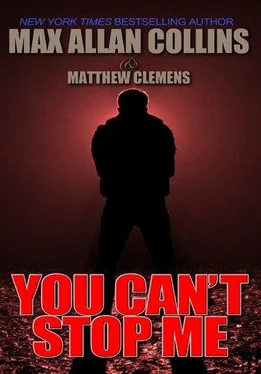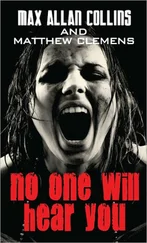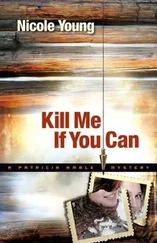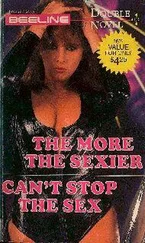“ Mommy! ”
Once he had her out, he took her by the arm and brought her to a standing position, but the sudden force caused her to stumble and fall. He bent down close, his face a blank mask, his eyes staring right through her.
As he pulled her to her feet again, not roughly, not gently, Katie wondered if it was possible that this man wasn’t a human at all. Adults didn’t look at kids the same way they did other adults, but they did have life in their eyes, and this stranger did not.
As he swept her to her feet, Katie thrashed and kicked, but the stranger was too strong.
“ Mommy! Mommy! ”
Her throat burned, the tears streaming now, her breath uneven as she tried to fight and scream at the same time, the shrill sound of her cries hurting her own ears.
Then the stranger dragged her into the kitchen and set her on the floor, almost gingerly, next to her mother.
Katie saw two little holes in her mother’s chest, Mommy, with blood on her mouth, staring wide-eyed at the ceiling, her eyes without life, like the stranger’s.
“ Mommy! ” Katie shrieked one last time, and she tried to shake her mother back to life, to no avail.
Katie looked up at the stranger, who was pointing something at her now — a gun. The ones her daddy had were bigger, but this was like the ones on TV. It looked like a big black squirt gun.
Beyond the gun, the man’s face remained blank as he aimed.
Katie’s eyes widened and her tears stopped and even her fear fled. Then she said something. She didn’t know why she said it, but she said it: “Now I lay me down to sleep...”
A flash filled her vision, and she fell backward into darkness. Her last thought — would Mommy be waiting for her, in Heaven? — ended when her head touched the floor.
It was all the Messenger could do to get out to the truck before he broke down. He was weeping as he drove away from the house where his most recent message had just been delivered.
“Got too close,” he whispered. “Got too close.”
In town, he made sure he was obeying the speed limit as he slowly scanned the darkening business district for a parking lot.
Finally, he saw a city park, down a block on a side street, which he turned onto, coming around on the far side, near a ball diamond.
No one was around.
He locked the pistol in the glove compartment, and got out of the truck. He’d walked only a few steps when he felt the bile rising in his throat. He had only a second to check for passersby before the vomiting doubled him over.
This had been bad. This had been the worst one.
The only thing that allowed him to carry out his missions was knowing that those who received his messages were just the delivery system — symbols, not people. That had gone blooey at the Hanson house. The little girl had nearly touched the inside part of him. Nearly? No, she had touched him.
He stood, wiping his mouth, and shook his head. It could never be like this again. He would have to be sharper, smarter. He couldn’t risk this sort of thing again. He might not be able to do what had to be done.
The little girl’s hysterical screaming rang in his ears, and he felt more coming up. He bent over just in time as he retched again.
Wasn’t supposed to be like this. All his work, all the time he had put in, couldn’t all be undone this easily, could it? That screaming little girl...
He looked up and down the quiet street. Nothing moved. Silence, blessed silence in this park. A block over, a dog barked. Somewhere he heard the revving of a car motor in a garage, someone obviously working on it.
His life had been like this once. Blessedly silent, boring even, until they ruined it...
He couldn’t stop delivering messages until someone made it better, until someone heard his pleas for help.
If it took delivering a hundred more messages to make the world pay attention, so be it. But he could not have another one like tonight. No more like tonight.
He was good at this, he knew that. Efficient. Not cruel. But tonight he had found out he still needed to improve, to become even more efficient.
As he climbed back into the truck, his stomach settled. On the long drive home he would lay the groundwork for the next message. He would redouble his efforts to know everything about the recipients beforehand. When he delivered the next message, and the one after that and the one after that, he would be more detached, more untouchable.
Tonight could never happen again.
The snow and the rain did not stop the postman on his appointed rounds, right? Or dogs or even screaming little girls.
Laurene met the sheriff’s gaze. “Mr. Hanson found something terrible, all right — his family dead.”
“Yes. Wife and daughter, both shot twice in the chest. You already know that your bullets from Florida match ours.”
“We understand Mr. Hanson took his own life.”
“Yes. Killed himself a week after the murders. Snapped. Hanged himself.”
Why, she wondered, was this killer punishing these men? Public servants coming home to slaughtered love ones? Or were fathers being punished?
She asked, “Who did the crime scene analysis at the Hanson home?”
“State BCI. We don’t have the tools for that kind of investigation.”
“What did they find?”
Fox held up a sheaf of photos. “You’ll want to look at these. Autopsy got us the bullets.”
“You think the photos should be helpful...?”
“Not my area, Ms. Chase. They’re crime scene photos, and maybe they’ll mean more to you.”
“What did you get from the photos, Sheriff? And from being on the scene?”
He thought for a moment. Then: “Guy was real careful. No fingerprints, no witnesses, and he collected the shell casings from the automatic. Only evidence they gathered were some tire tracks that didn’t match either of the Hanson vehicles.”
“Do you have those results?”
The sheriff nodded. “You take the photos and the tire marks information info too — these are dupes. When we’re finished here, I’ll request the BCI e-mail their files to you.”
“Thank you, Sheriff,” Laurene said, passing the folder of pictures to Carmen, who began thumbing through. The tire mark evidence Laurene gave to Choi.
“I’ll get started on these,” Choi said, glancing at the several sheets. The tool mark and firearms expert squeezed past the cameraman in the doorway, and was gone.
Turning back to Fox, Laurene asked, “Who interviewed the neighbors?”
“I did — but ‘neighbors’ overstates it. Neighbors are few and far between out that way. Nearest one’s almost a quarter of a mile away.”
Another similarity to the Harrow case, Laurene noted.
“What time of day did the crime take place?”
She knew the answer, of course — actually, she knew a lot of the answers. This was part of the Killer TV process: getting somebody like the sheriff here to deliver the exposition. Still, she liked getting this kind of stuff from the source.
The sheriff said, “Just before seven p.m.”
“Were the not-so-next-door neighbors home?”
“Yeah, only they didn’t hear anything. You wouldn’t expect them to — windy night, even for around here. Anyway, they could have missed the sound even if they’d been closer.”
Laurene asked Carmen, “Do you have any questions?”
“Actually, yes.” Carmen withdrew two photos from the folder, showing them to Fox.
One was a picture of the daughter’s room, where nothing appeared out of place — bed made, stuffed animals piled near pillows. A small table to the right of the bed was home to a considerable collection of snow globes, Disney characters mostly, whose familiar faces and forms were turned toward the bed. A desk held a computer, and, above it, shelves displayed the spines of DVDs and books, all neatly arranged. The second picture was a closeup of the table with the snow globe collection.
Читать дальше


![Сьюзан Кейн - Quiet [The Power of Introverts in a World That Can't Stop Talking]](/books/33084/syuzan-kejn-quiet-the-power-of-introverts-in-a-wo-thumb.webp)









